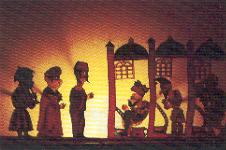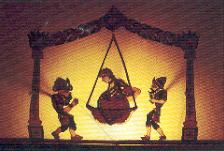Karagoz’un Sairligi (Karagos in the Poetry Contest): Karagoz enters a poetry contest among minstrels and beats all the other poets who present themselves having droll manners and costumes. He wins the prize, not by his talent in improvising poems on given rhymes and themes, but by his rudeness and violence.

Timarhane (The Madhouse): Karagoz, by talking too much to madmen who have escaped from an asylum, himself shows signs of insanity. Hacivat throws him in the Bedlam and chains him up. A few people make fun of him and a doctor recommends absurd drugs to cure him. Hacivat later saves him from the madhouse.
Yazici (The Public Scribe): Unemployed, Karagoz becomes a public scribe in a haunted shop, where he writes nonsensical latters for his clients. At length he is seen to be hanunted by a djin, hired for this purpose by Hacivat.
Salincak (The Swing): karagoz and Hacivat hire out a swing to their customers and Karagoz swindles his partner, Havivat of his share of the takings. To check up on Karagoz’s story, that nobady has come to be swung. Hacivat disguises himself as an old woman. A jew comes and feigns death and there follows a burial scene in which other jews bring in a coffin only to be frightened away by karagoz who heaves the dead jew out of the coffin.

Agalik (Karagoz, a rich Gentleman): Karagoz becomes rich by breaking the confidence of a rich Persian who had entrusted him with some large sums of money. He then tries to deal with each person who wants to be employed by him.
Orman (The Forest): Karagoz, while running an open air coffee house, becomes the unwilling accomplice of some highwaymen. They are caught after they have robbed several travellers.
Kirginlar (The Offended Ones): Karagoz kills Hacivat and his three stupid brothers, hides them in a large earthenware jar and sits on it. Hacivat’s cunning son succeeds in moving Karagoz from his seat and reveals the murder. Tuzsuz is going to punish him but later he is forgiven.
Cazular (The Witches): Two rival witches respectively have a son and daughter, who are in love but have quarrelled. Each of the lovers complains to the other’s mother. The two witches hold a contest during which several people are transformed into animals.
Sahte Gelin (The False Bride): Karagoz is made to disguise himself as a prospective bride to Matiz, in order to make him vow not to drink again. In fact on the nuptial night when Matiz lifts the veil of his bride and finds a bearded Karagoz instead a beatiful bride, he learns his lesson.
Sunnet (The Circumcision): Karagoz, though a full grown man, is circumized unwillingly like a little boy. The ceremony includes the usual spectacles and amusements to distract the boy who lies in bed after the circumcision.
Buyuk Evlenme (The Big Wedding): This includes a long parade in which the bride’s dowry is displayed. On her wedding night, Karagoz’s bride bears a child who is saucy, impertinent and swears obscenely and blasphemously from the moment he is born.
Meyhane (The Tavern): This play depicts the adventures of a notorious drunkard called Bekri Mustafa.

Hamam (The Public Bath): Çelebi, the dandy, has inherited two public bath, each of which is run by a woman who is a notorious lesbian. The woman become angry and leave the bathhouses. Now Çelebi wants them back as they are efficient and ask Hacývat’s help. In this way, they are reconciled. Karagoz, being lealous, watches his wife through the window of the bath house. A fire stars in the bathhouses and everybody comes out including karagoz with half his beard burnt, since the Persian henna-seller has mixed yellow arsenic with the henna. Karagoz is distressed because when there is no bath house he will loose the customers for his spice shop which is opposite.
Odullu yahut Karagoz’un Pehlivanligi (The Purse or Karagoz, the Wrestler): The rich father of a girl dies and makes it a condition that his future son-in-law should be able to bend his doughter’s arm. This is no men feat as the girl is very strong. For a long time, people have tried but none have succeeded. In the end, they ask Hacivat whether he knows, of anybody who could accomplish this. Karagoz succeeds in doing it but the girl’s mother makes another condition; that he should prove himself unbeatable by all other wrestlers. Karagoz accepts this challange also whereupon all the standard characters of the screen wrestler vith karagoz and are beaten. So Karagoz wins the girl.
Bahce (The Garden): Çelebi has a garden. He entrusts Hacivat with the running and concern of the garden and Hacivat recommends that he make it into a pleasure garden. Karagoz wants to get a job as a pipe player in the garden but Hacivat, who is the manager, refuses. Several people come and enter the garden. When Matiz comes, he says that in a respectable neighbourhood dancing and merriment cannot be allowed so he shuts the garden down until a licence is obtained.
Ferhat ile Sirin (Ferhat and Sirin): Ferhat, a young wall painter, is in love with Þirin, whose mother, a rich widow, does not want Þirin to marry Ferhat because he is poor. Eventually she is willing on one condition. Ferhat must succeed in bringing water from the nearby mountain using only a pickaxe, a challange which he accepts. So with the help of Karagoz, who is a blacksmith, Ferhat succeeds in bringing the water. Þirin’s mother who is still unwilling to accept the bargain, tries magic and other means to seperate the two lovers. However by killing the witch called Bok ana employed by the mother, the two lovers are united.
Tahir ile Zuhre (Tahir and Zuhre): A rich gentleman, following the advice of Hacivat, hires Karagoz as major domo in his household. The rich man’s doughter, Zühre and his nephew, tahir, love each other. But the step mother of Zühre also loves Tahir, so in order to stop their marriage, she decides to change her husband’s mind by magic. She enlists the help of Karagoz to put an amulet with magical properties on her husband, in order to make him change his mind upon awakens. In fact, he does change his mind upon awakening and separates the lovers. But later the truth is revealed, and Karagoz explains everything. Not only are the two lovers united but, as a reward, Karagoz also marries a girl from the richman’s household.
Kayik (The Boat): Karagoz and Hacivat both being unemployed and deserted by their wives, decide to work as boatmen. They hire out a boat to those who want to cross from one side of Bosphorus to the other. They encounter various difficulties and funny episodes with their customers.
Ortaklar (The Partners): Karagoz marries a second time, and the religious ceramony is performed by a priest who recites nonsensical prayers. Karagoz mother-in-law continuously pesters Karagoz by her visits. Later Karagoz’s first wife arrives and Karagoz tries to soothe her and hush the matter up but both the first and second wives claim their right over him. The first wive’s sister’s husband, Matiz arrives and threatens Karagoz but later forgives him.
Cambazlar (The Rope Walkers): In this play, we find a series of incidents which have no relation to one another. First Karagoz learns witchcraft from a sorcerer. Than he practices his mgaical knowledge by producing from an earthenware jar some of Hacivat’s belongings. These were in fact given by Hacivat’s daughter to her boy friend. Karagoz rides on donkey and encounters three girls with whom he converses. He later gets involved with tight rope walkers, during which he falls from the rope and dies. The gypsies then come to carry his coffin but Karagoz comes to life again.
There are other plots such as Tahmis (The Coffee Grinding), Bursali Leyla, Hain Kahya (The Villainous Major domo) Leyla ile Mecnun (Leyla and Mecnun) and others making some attempts to enrich the number of plays in the Karagoz repertoire. Also two examples should be given of short interludes, ara muhaveresi. One is Yalanci (The Lair) where Çelebi offers a money reward to the person who can tell him the greatest lie. Karagoz is brought forward by Hacivat as the best liar. He tells the Çelebi that his father lent Karagoz’s father a large sum of money, which he hopes Çelebi will repay. Çelebi is caught: either he must admit of it being just a lie and duly pay the reward or say it isn’t a lie and pay off the fictitious debt. The other is Mal Çikarma (The Treasure Hunting) in which Canan, supposedly a well known treasure hunter from azerbaijan, after transforming himself into a horrible-looking djinn, retrieces from Karagoz’s well various valuable objects including candelabras, clocks, necklaces and belts. Karagoz watching this, sends his dogs and chases Canan away, seizing the objects he has found. In turn, he decides to do same by assuming a disguise. He repeats the magical words but succeeds only in bringing out worthless objects such as snakes, rats, spiders and broken coffee pots etc…
*Traditional Turkish Shadow Theatre, By Metin And





